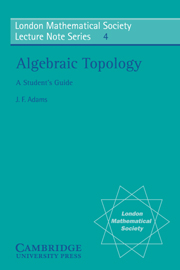Book contents
- Frontmatter
- Contents
- INTRODUCTION
- PAPERS ON ALGEBRAIC TOPOLOGY
- 1 Combinatorial homotopy
- 2 An axiomatic approach to homology theory
- 3 La suite spectrale. 1: Construction générale
- 4 Exact couples in algebraic topology
- 5 The cohomology of classifying spaces of H-spaces
- 6 Cohomologie modulo 2 des complexes d'Eilenberg-MacLane
- 7 On the triad connectivity theorem
- 8 On the Freudenthal theorems
- 9 The suspension triad of a sphere
- 10 On the construction FK
- 11 On Chern characters and the structure of the unitary group
- 12 Espaces fibrés et groupes d'homotopie. I, II
- 13 Generalised homology and cohomology theories
- 14 Relations between ordinary and extraordinary homology
- 15 On axiomatic homology theory
- 16 Characters and cohomology of finite groups
- 17 Extract from thesis
- 18 Relations between cohomology theories
- 19 Vector bundles and homogeneous spaces
- 20 Lectures on K-theory
- 21 Vector fields on spheres
- 22 On the groups J(X). IV
- 23 Summary on complex cobordism
13 - Generalised homology and cohomology theories
Published online by Cambridge University Press: 23 May 2010
- Frontmatter
- Contents
- INTRODUCTION
- PAPERS ON ALGEBRAIC TOPOLOGY
- 1 Combinatorial homotopy
- 2 An axiomatic approach to homology theory
- 3 La suite spectrale. 1: Construction générale
- 4 Exact couples in algebraic topology
- 5 The cohomology of classifying spaces of H-spaces
- 6 Cohomologie modulo 2 des complexes d'Eilenberg-MacLane
- 7 On the triad connectivity theorem
- 8 On the Freudenthal theorems
- 9 The suspension triad of a sphere
- 10 On the construction FK
- 11 On Chern characters and the structure of the unitary group
- 12 Espaces fibrés et groupes d'homotopie. I, II
- 13 Generalised homology and cohomology theories
- 14 Relations between ordinary and extraordinary homology
- 15 On axiomatic homology theory
- 16 Characters and cohomology of finite groups
- 17 Extract from thesis
- 18 Relations between cohomology theories
- 19 Vector bundles and homogeneous spaces
- 20 Lectures on K-theory
- 21 Vector fields on spheres
- 22 On the groups J(X). IV
- 23 Summary on complex cobordism
Summary
The next piece is a summary on generalised homology and cohomology written by me especially for the present work.
It is generally accepted that a functor can be called an ordinary homology or cohomology theory if it satisfies the seven axioms of Eilenberg and Steenrod (see Paper no. 2). These axioms serve to describe the behaviour of the functor on finite complexes. If we want to describe the behaviour of the functor on infinite complexes, we add suitable axioms about limits (see Paper no. 15).
A generalised homology or cohomology theory is a functor which satisfies all of the axioms of Eilenberg and Steenrod except for the dimension axiom. In addition, we may impose suitable axioms about limits. In recent years several such functors have been found useful in algebraic topology. The most important are κ-theory and various sorts of bordism and cobordism theory (see Papers no. 19, 20, 21, 23, 24). Various forms of stable homotopy and cohomotopy also satisfy the axioms, but are hard to calculate.
Obviously the beginning of the subject involves one in setting up various such examples and proving that they satisfy the axioms. This overlaps with topics to be considered below.
The next part of the subject, which is rather formal, consists in exploiting the consequences of the six axioms of Eilenberg and Steenrod which one does assume. For example, one has the Mayer- Vietoris sequence, and one has the spectral sequence of Atiyah and Hirzebruch (see § 12 and Papers no. 14, 19). If one wishes to study also infinite complexes, one exploits the consequences of whatever axiom one has on limits (see §12 and Papers no. 15, 16, 17).
- Type
- Chapter
- Information
- Algebraic TopologyA Student's Guide, pp. 146 - 165Publisher: Cambridge University PressPrint publication year: 1972



